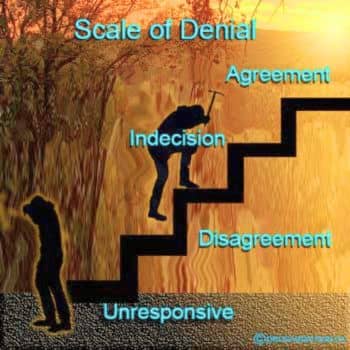A Scale of Denial in Addiction
Denial is often quite well-known to anyone who deals with a substance abuser. Others may not be aware that an addicted person would refuse to admit their difficulty. Normally, because of the nature of some substances, a person’s ability to recognize the ongoing downward spiral is compromised, and they simply do not see a problem.
But if one looks closely, one can observe a scale of denial. Anyone struggling with a mind-altering substance will go through specific stages when approached. These can be seen in Motivational Interviewing, but you, as a parent or friend, can get a person through these steps.
What is this Scale of Denial?
Most addicted people are under the influence of a chemical substance regularly. And each one is somewhere on this scale. How do they perceive it, if at all? It can be summed up as a scale of agreement or reality concerning their abuse.
At the lowest level, the person is Unresponsive. At a higher level, the person will be in Disagreement. A bit higher again, one will have Indecision. Finally, as the person arrives at the highest point, you will find them in Agreement and ready to seek help.


Enabler Defined
First Step in
Helping Someone

Unresponsive State, Nothing Seems to Register
One way to assist a person addicted to drugs or alcohol into accepting your help is to spot them on this scale.
For instance, if someone is unresponsive, they do not even pay attention to what you are saying or doing. Their only interest is in the next fix, score, or bottle. One option to get their attention is to become “real” to them.
You can achieve this by being interested in drugs or alcohol and what it does for the person. Get them to tell you what is desirable about it without judgment. That action will establish a dialogue, and you will be well on your way to getting the person through denial. But it may take some time before the person actually opens up. Just continue and get their perspective.

Dos & Don'ts
When
Helping
Intervention
Process

Once There's a Response, Keep it Going!
Once an exchange on a subject exists and the person responds to you, keep it going. After this exchange is well established, you can add comments on their quality of life, but always do it without judgment. Eventually, you will run into the person’s disagreements. You’re doing good; the person is one level up. You are now on the Disagreement level.
The disagreements can go on for some time. “I don’t need help,” “I don’t have a problem,” “It’s not that bad,” or “I’m not an addict,” etc. All of which are simply disagreements. Acknowledge and continue to bring up their quality of life, always without judgment.
One of the Levels: Indecision... "Maybe I should..."
When you help someone through these various stages, you will witness them starting to speak in other terms, like “I don’t know” or “well, maybe I…” and “but I am not sure if…” and any other statement that shows indecision.
You are now on the next level up on the scale of denial. It’s “I will, I will not,” “I can but cannot,” in any combination. Remember, “maybes” are indecisions. It can also include conditionals like “if I do it, maybe I could….”
As you continue to talk with this person, you will, sometimes rapidly and often over days or weeks, get them to the next level: Agreement. So, don’t stop there, be patient.

Backing Off
From Help
Drowning in
Someone's
Addiction

The Final Stage, Agreement to Seek Help
Agreement is the point at which the person recognizes that they need to take action about the condition. All your work has led up to this point.
However, this level will not show very openly. It often comes a bit disguised in such statements as: “I do need to do something,” “I can’t go on this way,” or “You’re right; things could be better.”
They may state their agreement straight out, like, “I need rehab.” No matter how the person says it, it is the level of Agreement. They will voice a request to want to change things in their life. Then, you contact our addiction referral counsellors or any other reference agent.
Your Support and Encouragement
You can and should, whenever possible, get the person in contact with the referral counsellor or a chosen facility. Having the person do this action puts them in control and responsible for their life decisions.
Be there to support, encourage and validate their decision. The intake counsellor or referral counsellor will do the rest. Keep practicing the scale of denial, and you can save other lives.
Back to Helping a Loved One
Intervention
Series
Find out more about us.
Testimonials

Marc Bernard
Author,
Addiction Field Specialist,
Referral & Consultation Counsellor, Ethics in Practice – NAADAC
Reviewed by Susan. Chubbs Drug and Alcohol Treatment Specialist


